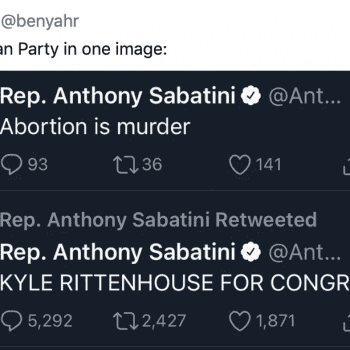There are a lot of things that the protesters at the Planned Parenthood clinic yell at the women walking in. One of the things is this:
Money is not an issue! If you need money, come to us and we will help you afford to keep your baby!
Every time I hear the protesters yell this, I am reminded of a post by Carl Freiburger of Life Action News, of my response to that post, and of his response to my response. In his first post, Freiburger responded to my assertion that if pro-lifers really care about preventing abortions, they should improve the social safety net to help women better afford to keep those pregnancies and raise the resulting children. His response?
The women she’s talking about presumably know they can’t financially handle parenthood, yet havechosen to bring the possibility of pregnancy into their lives. All of them could have chosen to say “not tonight,” and it wouldn’t have cost them a cent. Why isn’t it reasonable to expect people to factor basic responsibility into their decision-making? Why isn’t your preparedness for children something you should consider before having sex? And once you’ve brought about a situation you’re not ready for, why should the burden for alleviating it automatically shift to the rest of us? Most importantly, why should your child pay the ultimate price for costs you’ve incurred?
I responded with this:
But my whole point was that if it’s really about saving babies and not about making sure women face the full consequences of having sex, then the focus should be on finding a way to bring down the number of abortions that occur, not on forcing women to bear the entire “burden” of their choice to have sex. . . .
. . .
Pro-choicers often accuse pro-lifers of being pro-fetus but anti-child. As a pro-lifer I thought the accusation was ludicrous, but I understand it now. You see, by requiring a poor woman to bear the full consequences of having sex and refusing to support any programs that might help her handle those costs, pro-lifers doom her child to a life of utter poverty. Programs like medicaid or Head Start aren’t about enabling lifestyle choices pro-lifers find abhorrent. Rather, they’re about helping poor children. And yet, Freiburger seems to see these very children as simply a form of punishment meted out to poor women for having sex when they couldn’t afford children.
[In his last sentence] Freiburger is talking about a fetus. Once he starts talking about a child – and the costs involved in raising a child – he absolutely thinks that that child should have to pay for her mother’s decision to have sex when she couldn’t afford children. Because, you know, programs to give that child a better life than grinding poverty would be shifting “the burden for alleviating” the situation the mother wasn’t ready for “to the rest of us.” Fetuses shouldn’t have to pay, but children should.
Freiburger responded by doubling down:
We know from example that children can overcome far worse than poverty; many don’t, but to Anne, they don’t deserve even the chance to try.
. . .
This whole conversation is peripheral to the real issue: if the unborn have unalienable rights and intrinsic value like the born do, then no economic rationale would justify their destruction; if they don’t, none would be needed.
. . .
Modern radical feminism is animated in large part by a visceral anger at the fact that biology gives their sex an unequal share of the work in procreation and is obsessed with leveling things out . . . no matter the human toll. . . . To suggest that exercising basic responsibility is more sensible and humane than extinguishing another’s life is absolutely taboo, even though in most other areas of life we understand that responsibility is one of the basic necessities of adulthood. And yes, Libby, making (not “suggesting that”) Person A pay for Person B’s mistakes is wrong.
Freiburger’s post indicates that he is not okay with any programs aimed at helping poor children or at helping alleviate the financial burden of having children. Frieburger’s basic argument is that if you get pregnant and can’t afford a child, too bad, deal. (Freiburger also argues that things like paid maternity leave and universal healthcare would have absolutely no impact on the abortion rate, which sort of blows my mind.) Strangely, Freiburger does not even talk about things like charity or the church in his post, things conservatives usually bring up in response to progressive calls for an improved social safety net. But to bring this back to where I started, I’m going to assume that that’s what the protesters at the clinic where I escort are talking about—help from a church or charity.
Back when I was a conservative, I employed some combination of these same ideas. I believed that people should take personal responsibility for their actions and that welfare and other programs got people off the hook for this and thus enabled bad decisions. I also believed that the church and private charities were best suited to help people because they could personally mentor people, require individuals to be making progress toward financial independence, and work on the root cause of the problem, spiritual darkness.
I’ve been sitting here mulling the difference between church and charity programs on the one hand, and government programs on the other. There is no question in my mind that if I were to find myself with a pregnancy I could not afford, I would take what a government program had to offer over a church or charity program any day. The thing I keep coming back to is strings. Churches and charities often come with strings attached. Government programs generally don’t. And for conservatives, this is the beauty of trusting churches and charities rather than government programs. And it’s not because I want to be lazy. It’s because I want to preserve as much dignity as I can. And maybe this is the wrong way of looking at things, but I’m sure I’m not the only person to see them this way.
In the end, progressives and conservatives have very different visions of society. This private charity/public program dichotomy is one of them. The idea that people should suffer for making bad decisions rather than having their falls cushioned is another. This difference affects the way conservatives approach the abortion issue and renders them incapable of working toward a comprehensive government social safety net.
The thing is, there’s only so much a church or private charity can do. When the protesters offer financial assistance, are they talking about compensating for the loss of income at jobs that don’t offer paid maternity leave? Are they talking about covering childcare expenses? Are they talking about putting up money for college in eighteen years? I could be wrong, but I highly doubt it. But public programs can help with these things—paid maternity leave, subsidized daycare, bringing down the costs of public universities, even things as simple as larger child tax credits. I’m in favor these things because I see the next generation of citizens as something worth investing in. People like Freiburger, however, see children a person can’t afford to raise as the proper punishment for irresponsible sex. (You can always give the child up for adoption, Freiburger insists.)
In the end, I suppose, you might say it’s just a difference in perspective.
[For related reading, see the Slacktivist on conservative opposition to the Pregnant Workers’ Fairness Act here.]













